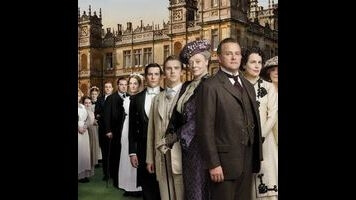Downton Abbey finds meaning in grief, nonsense in narrative

As Lady Mary Crawley fights off one of her many suitors, she suggests she finds his behavior “both irritating and beguiling in equal measure.”
This largely describes Downton Abbey in its fourth season, a well-made frustration of a television show capable of pathos and incapable of avoiding the pitfalls it has fallen into since its second season. Downton Abbey is rarely outright terrible, but four seasons in it remains a disappointment, insistent on injecting plot into a series that works best without it. While more focused than the season that preceded it, it suffers from a reliance on storylines that, in their desire to shock, strip the series of what makes it compelling.
The best stories on Downton Abbey are driven by the everyday. These are stories about the people who live and work at Downton Abbey during a time of transition, whose lives and livelihoods are changing. There is inherent drama in this period of British history, with clear stakes for characters both upstairs and down, and the fourth season is at its best when it lets those stakes drive its storytelling. What happens when you’re a valet whose employer dies, leaving you a remnant of a class system struggling to survive? What if you remain gainfully employed, but see an opportunity to follow a dream that’s not dependent on the aristocratic system that remains in jeopardy? Those questions may not be as flashy as the latest calamities to befall Edith Crawley—Laura Carmichael continues to star in television’s most unintentionally hilarious tragedy—but the show has finally reached the point where the threat of modernity is more than just the installation of a new piece of technology. Although the season comes with more on-the-nose symbols of progress, it makes for rich historical context this time around.
The fourth season is also in solid form when it’s telling the story of a family grieving the loss of two of their own. While at times overbearing in its reminders that Lady Mary and Tom Branson were each widowed in the third season, their efforts to pick up the pieces offer a clear line of progression for the new episodes, and Isobel’s struggle to find her purpose in light of her son’s death becomes one of the show’s smallest yet most satisfying developments. Most often paired off with Maggie Smith’s Dowager Countess, Isobel (Penelope Wilton) gets room to explore the difficulty of living with grief when she’s lived most of her life already. Though their story meanders, the two women form an odd-couple friendship—or, to use Alice Munro’s word, hateship—as the season progresses, an often-charming interlude to the chaos around them.
That chaos remains Downton’s biggest downfall. The insistence on introducing nefarious agents into the series becomes ungainly early in the season, as the offscreen departure of Mrs. O’Brien leads to a revolving door of devious maids who join Thomas in twirling figurative mustaches to no particular end. While that cycle at least slows down toward the conclusion of the season, Mary’s collection of suitors only grows, and the series takes for granted that the audience is invested in her courtship. None of the suitors particularly stand out, making the whole affair rather dull (especially given that no resolution is even hinted at before the season-ending Christmas special, which was not screened for critics).
More importantly, however, Downton Abbey remains committed to tackling big issues, and remains rather inept at handling those issues effectively. The series has mostly resisted discussing the intersections of race and class in British history, but this season makes a step in that direction with the introduction of jazz singer Jack Ross (Gary Carr); however, the storyline feels too much like Racism Comes To Downton Abbey, so conspicuous that it loses its capacity for nuance or character development. The same goes for the season’s most shocking event, in which one of the series’ characters is the victim of sexual assault. Although honest and stark in its depiction of the aftermath of such an attack, the effect it has on the characters involved quickly becomes repetitive and one-dimensional. It devolves from a character story to a plot point too swiftly for that honesty to shine through.
While Downton Abbey has been stuck in the same basic theme of “tradition versus progress” for four seasons now, the closer it inches toward modernity, the more dynamic its basic setting of becomes, and there are moments in season four—particularly late in the season—when this version of the show shines through. However, the kind of stories Julian Fellowes tells within that setting remain ill-suited to the task of capitalizing on that dynamism, falling into repetitive patterns that make this season unlikely to convince those growing numb to the series’ milieu that Downton Abbey will ever embrace its full potential.
Created by: Julian Fellowes
Starring: Hugh Bonneville, Michelle Dockery, Elizabeth McGovern, Allen Leech, and Maggie Smith.
Airs: Sundays at 9 p.m. eastern on PBS
Format: Hour-long drama
Seven season-four episodes watched for review